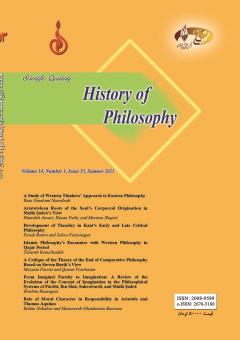Role of Moral Character in Responsibility in Aristotle and Thomas Aquinas
Subject Areas : Geneology of philosophical schools and Ideas
Rahim Nobahar
1
![]() ,
Mansooreh Ghanbarian Banooee
2
,
Mansooreh Ghanbarian Banooee
2
![]()
1 - Associate Professor, Department of Islamic Law, Shahid Beheshti University, Tehran, Iran
2 - PhD Candidate of Criminal Law and criminology, Shahid Beheshti University, Tehran, Iran
Keywords: moral agent, moral responsibility, personality, independent stimulus, self-subsistent stimulus, sudden acts, Aristotle, Aquinas,
Abstract :
Aristotle’s theory of moral responsibility, as a pioneer theory of ethics of virtue, presents a new approach to responsibility because of its particular attention to moral conduct. Aquinas, a follower of Aristotle, has provided a new interpretation of moral responsibility with an emphasis on character and a focus on completely voluntary human acts and the role of apriori reflection on act. In the views of these two philosophers, moral agent is an agent who possesses knowledge, personality vice, and the ability to perform completely voluntary acts. Accordingly, children and animals are never subjected to moral evaluations because they lack such moral capacities and characters. Aristotle and Aquinas believe that the realm of moral agents, in addition to evil and virtuous people, includes restrained and non-restrained ones. Following a descriptive-analytic method, the present paper investigates the conditions under which the acts of moral agents are subjected to ethical evaluations in the views of Aristotle and Aquinas. Based on the findings of this study, those acts that become the subjects of moral responsibility must be done voluntarily based on the moral character of the agent as a non-accidental stimulus for act, even if they do not originate in deliberation and are not based on prior decision making. This is because sudden acts also originate in certain sources and function as clear references for moral evaluations.
باتلی، هتر (1398) فضیلت؛ بررسیهای اخلاقی و معرفت¬شناختی، ترجمۀ امیرحسین خداپرست، تهران: کرگدن.
خزاعی، زهرا (1389) اخلاق فضیلت، تهران: حکمت.
ریچلز، جیمز (1397) فلسفه اخلاق، ترجمۀ آرش اخگری، تهران: حکمت.
هرست هاوس، روزالین (1396) «¬اخلاق فضیلت¬»، ترجمۀ هاشم قربانی، اطلاعات حکمت و معرفت، سال 12، شمارۀ 6، ص18ـ12.
هولمز، رابرت (1396) مبانی فلسفه اخلاق، ترجمۀ مسعود علیا، تهران: ققنوس.
هینمن، لارنس (1398) اخلاق؛ رویکردی کثرت¬گرایانه به نظریۀ اخلاق، ترجمۀ میثم غلامی و همکاران، تهران: کرگدن.
Allmark, P. J. (2008). An Aristotelian account of autonomy. Journal of value inquiry, vol. 42, no. 1, pp. 41-53.
Barney, R. (2020). Becoming bad: Aristotle on vice and moral habituation. Oxford Studies in ancient philosophy. ed. by V. Caston. vol. 57, pp. 273-308. Oxford: Oxford university press.
Bobzien, S. (2014). Choice and moral responsibility Nichomachean ethics iii 1-5. Cambridge Companion to Aristotle’s Nicomachean Ethics. ed. by R. Polansky. pp. 81-109. Cambridge: Cambridge university press.
Daigle, J. (2015). Aristotle, determinism and moral responsibility. Submitted in partial fulfillment of the requirement for the degree of MA. Supervisors: F. J. Berry, T. O’Keefe¬. Department of Philosophy, College of Arts and Sciences, Gorgia State university.
Echenique, J. (2012). Aristotle`s ethics and moral responsibility. New York: Cambridge university press.
Furlong, P. (2017). Aquinas and the epistemic condition for moral responsibility. Res philosophica, vol. 94, no. 1, pp. 43-65.
Hause, J. (2006). Aquinas on non-voluntary acts. International philosophical Quarterly, vol. 46, no. 4, pp. 459-475.
Heinaman, R. (2009). Voluntary, involuntary, and choice. Companion to Aristotle, ed. by G. Anagnostopoulos, pp. 483-497. Hoboken. NJ: Blackwell.
Kent, B. (2007). Aquinas and weakness of will. Philosophy and Phenomenological Research, vol. 75, no. 1, pp. 70-91.
McFadden, J. (2020). Aquinas on moral responsibility without deliberation. Submitted in partial fulfillment of the requirements for the degree doctor of philosophy. Director: T. Hoffmann¬. Faculty of the School of Philosophy. The Catholic university of America.
McGinn, B. J.; Marty, Martin E.; Hick, J.; Pelikan, J.; Wainwright, G.; Chadwick, H.; Sullivan, L. E.; Fredericksen, L.; Hogg, W. R.; Crow, P. A.; Lindberg, C. H.; Spencer, S.; Benz, E. W.; Stefon, M. (2023). Christianity. Encyclopedia Britannica, https://www.britannica.com/topic/Christianity.
Meyer, S. S. (1988). Why involuntary actions are painful? The southern journal of philosophy, vol. 27, no. 1, pp. 127-158.
Meyer, S. S. (1994). Self-Movement and external causation. Self motion: from Aristotle to Newton. eds: ¬M. L. Gill and J G. Lennox. pp. 65-80. Princeton: Princeton university press.
Meyer, S. S. (2011). Aristotle on moral responsibility: character and cause. New York: Oxford university press.
Muller, J. (2015). Agency and responsibility in Aristotle's ¬Eudemian ethics. Pronesis, vol. 60, no. 2, pp. 206-251.
Myers, T. A. (2019). St. Thomas Aquinas on the conditions for moral responsibility. Holy Apostles College & Seminary, Dr. Jon Kirwan, PHE 781: The Philosophy of Thomas Aquinas.
Oakley, J. (2007). ¬Virtue theory.¬ Principles of health care ethics. eds: ¬R. E. Ashcroft, A. Dawson, H. Draper, and J. R. McMillan.¬ pp. 87-91. Hoboken NJ: John Willey and sons.
Perkams, M. (2013). Aquinas on choice, will, and voluntary action. Aquinas and the Nicomachean Ethics. eds: T. Hoffmann, J. Muller and M. Perkams. pp. 72-90. New York: Cambridge university press.
Santos Campos, A. (2013). ¬Responsibility and justice in Aristotle`s non-voluntary and mixed actions¬. Journal of ancient philosophy, vol. 7, no. 2, pp. 100-121.
Schauber, N. E. (2003). ¬Aristotle on animal, agency and voluntariness¬. Richmond journal of law and the public interest, vol. 7, no.1, pp. 26-50.
Stepinova, M. (2011). Aquinas's solution of Aristotle's incontinent Man and Augustine's two Wills. New Blackfriars. vol. 92, isu. 1039, pp. 322-340.
Wei, L. (2016). Aristotle on Prohairesis¬. Labyrinth: an international journal for philosophy, value theory and sociocultural Hermeneutics. vol. 18, no. 2, pp. 50-74.


